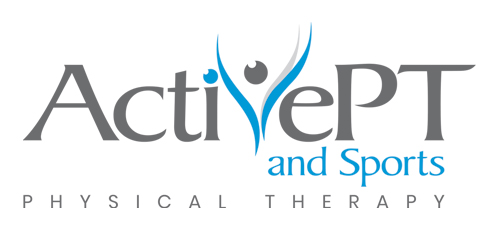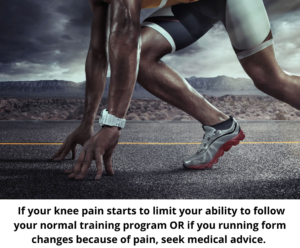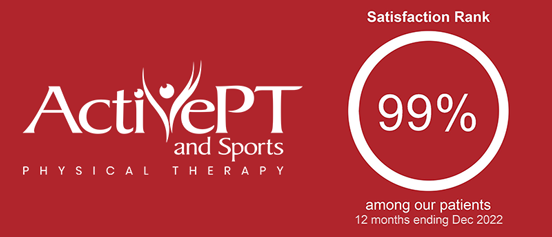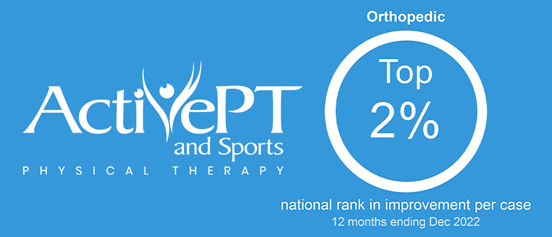by Savannah Meaike, DPT, RRCA certified running coach
Training for a full or half marathon is challenging enough without knee pain. Add a knee injury and the decision of whether to push through pain or stop can be especially difficult. Knowing when and how to continue to train if you develop knee pain is a crucial decision. It can mean completing your race goals or struggling with knee pain for years to come.
COMMON TYPES OF KNEE PAIN DURING MARATHON TRAINING
Many different types of knee pain can creep up during your marathon or half-marathon training program. Each has its own unique challenges. Learn how to respond if your knee pain starts to interfere with your training program.
RUNNER’S KNEE
Runner’s knee, also known as patellofemoral pain syndrome (PFPS), is one of the most common injuries we treat in runners. If your pain is located around or deep under the knee cap, you may be suffering from runner’s knee. While not everyone with runner’s knee experiences the same symptoms, many report a similar pattern of pain. Pain often increases:
- During or after running
- Running up or down hills
- During deep squatting, lunges, or kneeling
- Going up and down stairs
- During prolonged sitting, if the knee is bent
- When standing from a seated position (especially after prolonged sitting)
Although it can be quite painful, PFPS is not a severe injury. Think of it as a very irritated area between two bones. This means you can often keep training with PFPS! Modifying your training program to reduce speed and hill workouts should be your first approach. Check your cross-training program and cut back on single-leg squats and lunges initially until the pain is under better control. Change your focus to be on stabilization exercises for your hips because bad form and poor hip control can lead to PFPS. The goal with PFPS during marathon training is to reduce symptoms enough to allow for good running mechanics. For more tips on training with runner’s knee, check out this blog.
IT BAND PAIN
This sharp pain can be both concerning and debilitating. The pain will typically be located along the outside of the knee and hurts when the knee is moving. Most often, ITB pain is not nearly as bothersome at rest, however, the exception may be sitting positions with a lot of knee flexion (e.g. sitting on your feet). Trying to train for a marathon while suffering from this type of knee pain is challenging. The pain is often sharp when running or walking downhill, or as mileage progresses. When the pain is intense, it often causes runners to limp or change their running form.
While IT band pain feels severe, the problem itself is not severe. The pain is often a result of friction caused by the IT band rubbing against the structures on the side of your knee. Runners with IT band pain can often continue to train for their marathon with clear guidance from a physical therapist that specializes in running injuries.

HAMSTRING PAIN
When training for a marathon, your hamstrings put in serious work! Unfortunately, for this reason, hamstring strains are common in endurance runners. These injuries most commonly occur when you are overtraining, not getting enough recovery, or have increased the load on your hamstrings too quickly. Weak glutes can be another reason; this results in you propelling your body forward each step with more hamstring than glutes.
Your hamstring muscles all originate just below the buttock on a bone that is often called the “sit bone.” The middle of your thigh is the muscular portion of your hamstrings. The three hamstring tendons attach to the sides of your knee. You can strain your hamstring muscle or tendons at any point along their path. They are especially susceptible to injury when training for a full or half marathon if you increase your mileage, speed, intervals, or hills too quickly. Unlike IT band pain, pushing through a hamstring injury can definitely worsen the damage! We always recommend having hamstring pain assessed in a medical setting so you know if it’s safe to push through pain or not. Severe hamstring injuries can affect running for the rest of your life if not rehabilitated properly.
WHEN TO RUN AND WHEN TO STOP
As a general rule of thumb, if your knee pain starts to limit your ability to follow your normal training program OR if your running form changes because of pain, seek medical advice. It doesn’t mean you have to stop, but have your pain assessed by a running specialist to determine if you should be pushing through pain or not. A well-trained running specialist will help you adapt your marathon or half marathon training program rather than telling you to stop completely. If the injury is severe enough, they will be honest with you about the long-term consequences of pushing through the pain. Be wary of practitioners who use a one-size-fits-all approach of “stop running” as advice for any running injury.
The running team at ActivePT takes an individualized approach to allow you to continue to train for your upcoming race while rehabilitating your running injury. Free 15-minute screening appointments allow you to get in quickly (via video or in-person appointments) and have your questions answered quickly by one of our running specialists. In-clinic care at ActivePT includes a thorough evaluation and treatment. Treatment options may include hands-on soft tissue treatment techniques, exercise and cross-training recommendations, shoe and running form assessment, taping, or dry needling. If you are looking to have your running form assessed or help with your marathon/half-marathon training program, check out our running performance packages. We want to get you to the finish line quickly, safely, and effectively.
ABOUT THE AUTHOR – RUNNERS TREATING RUNNERS
Savannah is a member of our team of running specialists at ActivePT. She is a doctor of physical therapy, a certified running coach by RRCA, and enjoys endurance running. Her favorite races include the Napa to Sonoma Half Marathon, the Ragnar Relay So Cal (Huntington beach to San Diego), and the Houston Marathon. Savannah loves helping runners get to the finish line!
If you are having pain or problems, schedule a free 15-minutes screening appointment to meet with a therapist in person.





